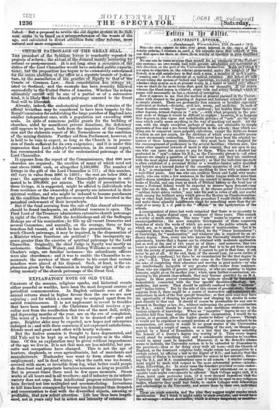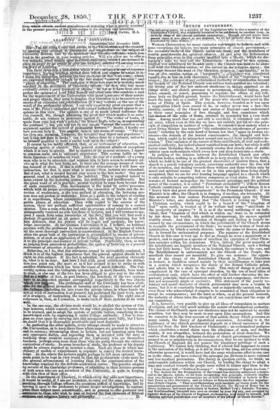t 5 111 f t
yt
.001 11' m .A.M
• various subjects of knowledge. When an " inceptive" degree in tiny of the faculties had thus been attained after specific examination, I would by no means, as at present, allow the higher grades to follow of course. Though it would not be expedient to compel persons of a certain age to submit to an examination, yet surely it would be no great matter if the Universities were to demand a couple of essays, or something of the sort, on themes ap- pointed by a Board of Examiners, as a test that the person soliciting the honour of a Doctor's degree was worthy of it. Thus every degree would stand for something real, and a considerable stimulus to exertion would in many cases be imparted. Moreover, if, as Mr. Sewell's silence seems to indicate, the University system is to be extended to Dissenters in the provinces—thus so far doing away with all tests—still the Church of England, as the dominant religious body, might retain her prerog,ative to a certain extent, by affixing a test to the degree of B.D:, and making that the certificate of fitness to become a candidate for orders in her ministry, throw- ing the B.A. and M.A. examinations open to all corners. A similar arrange- ment might be made with respect to the more substantial prizes—seholar- ships, fellowships, &c. In many cases the founders provided certain endow- ments for each of the respective faculties. A new adjnstment on a more equable basis might conveniently be effected. Each College might still, if it chose, insist upon particular tests, (if it were deemed expedient that the University teat should be abelished,) and it might be open to any religious bodies, whenever they could find funds, to endow Colleges with fellowships and scholarships in the University, and secure them by their own individual tests. These are crude remarks, and the plan they suggest might require *itch modification. But I think it might easily be made available, and would 'have the advantage—without deserffctiotr, which is always dangerous, or conafrac•
I .
this direction on the part of the nivern sea own tool:tit:et/At 801Ienfe.tp
Sewell, it is stiii sat/afactery
"darning asita";-/in the.PlasilainW.K4t Of extendingithe Systesa.of-9.49E8 v, wliether.-:thaCaystem atit at,Prate4 YNT muse we ahalidt, far MOM haTc;t411/ whence the ,blood issue& is vitiated, -01WITPTt. passes will: necessarily be hats!, el4a0aeligcsyt: ) Now it appears to me that the:met:114g presetivp, sities with respect to the granting of degreei and henorary re ards of is simply absurd. There are profeaaedly four sciences or faculties especiall cultivated at Oxford—divinity, civil law, music, and Medicine. In each o these faculties certain " degrees" are conferred ; but besides thesmthere other degrees,termed degrees in " arts ",—with what propriety in the pre=" sent state of things it would be difficult to explain however, it so happens,[' that degrees in this vague and undefinable province of "arts " are the only ones which really mean anything in the way of marking out merit. All the rest, with the single exception perhaps of music are attainable by simple, 1 payments of fees.and a pro forma disputation in the schoolc;than which no,' thuw can be conceived more palpably ridiculous, except the fietitious fbrink - of action in ,jaw courts, for the abolition of which every sensible person': is now strenuomily contending. This could never bare been the originalin tention of these honorary distinction's : they must have been designed Rai' the encouragement of proficiency inthe several faculties ; whereas now, likd' many other apparent rewards of merit in this country, they are open to any one who can spare the money to pay for them. When once a student had' graduated in. " arts"---taken his B.A., as the University phrase is—all other hopours are simply a question of time and money, and they are conferred' with the most signal contempt for propriety; so that the ludicrous spectacle' is often exhibited of a reverend divine or -a weather-beaten sailor qualified' and habited as a learned doctor of the recondite mysteries of civil law! k " B.A." is omnipotent : he can become anything he likes with patience and a well-filled purse. Any one who can construe Greek and Latin very model./ rately, who can write a few sentences in the latter tongue without more that half-a-dozen mistakes of grammar, who can commit to memory the-first tine, books of Euclid, and can cram as much of Biblical history as the heed boy -Of many a National School would be expected to answer upon demand—any one who can do this, after a few years, if he chooses quoad Unirersitatem " sublimi feriet sidera vertices may take his seat in robes of silk and scarlet cloth among the brilliant array which graces the theatre oMCominenioriitibia4 day or other high festivals. Now all this procedure I would abolish entirely; and make these splendid habiliments stand for something more than the re= ceipt of so many £. 8. d. paid to the " officials" in the apodyterium of the schools. A correspondent of yours last week remarked that there is no necessity to make a B.A. degree depend upon a residence of three years. This remark is worthy of much attention. The term "arts" seems to express a sort of omniumgatherum ; the more complete development of those numerous branches of study the seeds of which are sown at the public schools, and which are, so to speak, in embryo at the time of matriculation. Let it be considered then to stand for this—at Oxford, for the "literal humaniores ; at Cambridge, for " mathematics," and whatever else is required for an or- dinary degree. Now, every one who knows the University standard for at,- quiremente, . knows that a degree can be obtained With moderate application just as well at the end of two years as of three ; and moreover, that t*e years is quite sufficient to attain all the good that is to be got from mixing with the society of gentlemen. For if it cannot be got in that time, it chit never be got at all. At the end, then, of the second year, (or even earlier if it be thought expedient,) let there be an examination for the first degree 'in "arts "—B.A. Then let all those who come to the University merely lot .0F.381 be07,amborough, Warwicks-hire,17th Decemb.-r 18:0. i3rtme Ry fidesebatinahe latiefentaysai citysyetainOrno.teaef:wlol



























 Previous page
Previous page